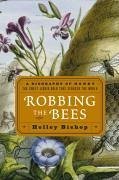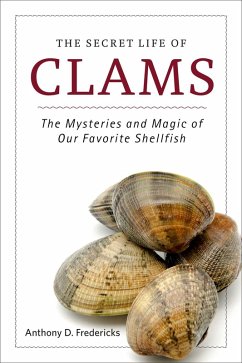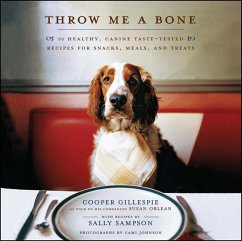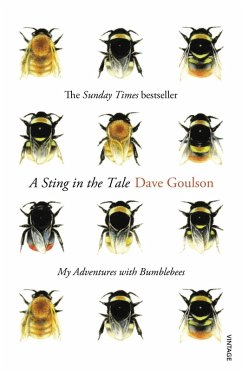
Robbing the Bees (eBook, ePUB)
A Biography of Honey--The Sweet Liquid Gold that Seduced the World

PAYBACK Punkte
0 °P sammeln!
"Honey has been waiting almost ten million years for a good biography," writes Holley Bishop. Bees have been making this food on Earth for hundreds of millennia, but we humans started recording our fascination with it only in the past few thousand years -- painting bees and hives on cave and temple walls and papyrus scrolls, revering them in poetry and art, even worshipping these amazing little insects as gods. From the temples of the Nile to the hives behind the author's own house, people have had a long, rapturous love affair with the beehive and the seductive, addictive honey it produces. C...
"Honey has been waiting almost ten million years for a good biography," writes Holley Bishop. Bees have been making this food on Earth for hundreds of millennia, but we humans started recording our fascination with it only in the past few thousand years -- painting bees and hives on cave and temple walls and papyrus scrolls, revering them in poetry and art, even worshipping these amazing little insects as gods. From the temples of the Nile to the hives behind the author's own house, people have had a long, rapturous love affair with the beehive and the seductive, addictive honey it produces. Combining passionate research, rich detail, and fascinating anecdote, Holley Bishop's "Robbing the Bees" is an in-depth, sumptuous look at the oldest, most delectable food in the world.
Part biography, part history, "Robbing the Bees" is also a celebration, a love letter to bees and their magical produce. Honey has played significant and varied roles in civilization: it is so sweet that bacteria can't survive in it, so it was our first food preservative and all-purpose wound salve. Honey wine, or mead, was the intoxicant of choice long before beer or wine existed. Hindus believe honey leads to a long life; Mohammed looked to honey as a remedy for all illness. Virgil; Aristotle; Pythagoras; Gregor Mendel; Sylvia Plath's father, Otto; and Sir Edmund Hillary are among the famous beekeepers and connoisseurs who have figured in honey's past and shaped its present.
To help navigate the worlds and cultures of honey, Holley Bishop -- beekeeper, writer, and honey aficionado -- apprentices herself to a modern guide and expert, professional beekeeper Donald Smiley, who harvests tupelo honey fromhundreds of hives in the remote town of Wewahitchka, Florida. Bishop chronicles Smiley's day-to-day business as he robs his bees in the steamy Florida panhandle and provides an engaging exploration of the lively science, culture, and lore that surround each step of the beekeeping process and each stage of bees' lives.
Interspersed throughout the narrative are the author's lyrical reflections on her own beekeeping experiences, the business and gastronomical world of honey, the myriad varieties of honey (as distinct as the provenance of wine), as well as illustrations, historical quotes, and recipes -- ancient, contemporary, and some of the author's own creations.
Part biography, part history, "Robbing the Bees" is also a celebration, a love letter to bees and their magical produce. Honey has played significant and varied roles in civilization: it is so sweet that bacteria can't survive in it, so it was our first food preservative and all-purpose wound salve. Honey wine, or mead, was the intoxicant of choice long before beer or wine existed. Hindus believe honey leads to a long life; Mohammed looked to honey as a remedy for all illness. Virgil; Aristotle; Pythagoras; Gregor Mendel; Sylvia Plath's father, Otto; and Sir Edmund Hillary are among the famous beekeepers and connoisseurs who have figured in honey's past and shaped its present.
To help navigate the worlds and cultures of honey, Holley Bishop -- beekeeper, writer, and honey aficionado -- apprentices herself to a modern guide and expert, professional beekeeper Donald Smiley, who harvests tupelo honey fromhundreds of hives in the remote town of Wewahitchka, Florida. Bishop chronicles Smiley's day-to-day business as he robs his bees in the steamy Florida panhandle and provides an engaging exploration of the lively science, culture, and lore that surround each step of the beekeeping process and each stage of bees' lives.
Interspersed throughout the narrative are the author's lyrical reflections on her own beekeeping experiences, the business and gastronomical world of honey, the myriad varieties of honey (as distinct as the provenance of wine), as well as illustrations, historical quotes, and recipes -- ancient, contemporary, and some of the author's own creations.
Dieser Download kann aus rechtlichen Gründen nur mit Rechnungsadresse in A, B, BG, CZ, D, DK, EW, E, FIN, F, GR, HR, H, I, LT, L, LR, NL, PL, P, R, S, SLO, SK ausgeliefert werden.













